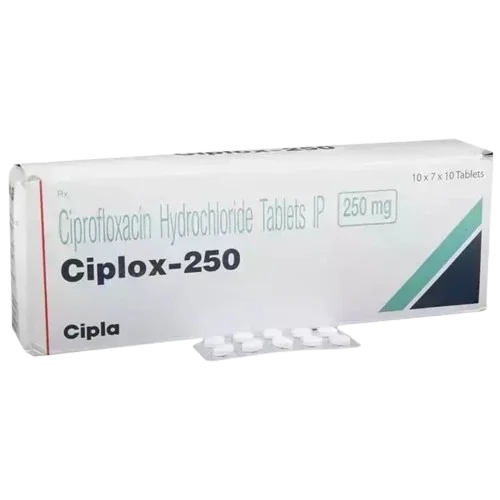Its Strong Bacterial Killing Action prevents bacteria from multiplying by targeting their DNA replication. Ciplox 250 mg Tablet is FDA-approved and ensures safety, efficacy, and high-quality standards. Its Deep Tissue Penetration works well for complicated infections like UTIs, respiratory infections, and bone infections. The convenient dose is twice daily for most infections.
What is Ciplox 250 mg?
Ciplox 250 mg contains Ciprofloxacin, a fluoroquinolone antibiotic that fights bacterial infections by targeting their DNA replication process.
Ciplox 250 mg Mechanism of Action
Blocks DNA Gyrase & Topoisomerase IV
Bacteria need these two enzymes (DNA gyrase & topoisomerase IV) to replicate, repair, and divide. Ciprofloxacin binds to these enzymes and prevents bacterial DNA from unwinding and duplicating.
Disrupts Bacterial Growth & Kills Bacteria
Without proper DNA function, bacteria cannot multiply or repair themselves. It leads to bacterial cell death and elimination from the body.
Rapid Absorption & Deep Tissue Penetration
Ciplox 250 mg works within a few hours of the first dose and reaches high concentrations in tissues, which is effective for UTIs, respiratory infections, gastrointestinal infections, and bone infections.
Broad-Spectrum Action against Bacteria
Effective against Gram-negative and Gram-positive bacteria, commonly used against E. coli, Pseudomonas, Klebsiella, Staphylococcus, Streptococcus, and Salmonella.
Why is This Mechanism Unique?
Ciplox 250 mg works differently from penicillins and cephalosporins, making it useful against antibiotic-resistant bacteria. Ciplox kills bacteria directly rather than just stopping their growth. It works well for complicated infections where other antibiotics may fail.
What are the Uses and Benefits of Ciplox 250 mg?
Uses of Ciplox 250 mg
Ciplox 250 mg is a broad-spectrum antibiotic used to treat various bacterial infections, including:
- Urinary Tract Infections (UTIs) – Treat bladder infections, kidney infections (pyelonephritis), and prostatitis.
- Respiratory Infections – Ciplox treats bronchitis, pneumonia, and sinus infections.
- Gastrointestinal Infections – Treats Traveler’s diarrhea, typhoid fever, and food poisoning caused by bacteria like Salmonella and Shigella.
- Skin & Soft Tissue Infections – Helps heal wound infections, cellulitis, and abscesses.
- Bone & Joint Infections – Treats osteomyelitis (bone infection) and septic arthritis.
- Sexually Transmitted Infections (STIs) – Treats specific cases of gonorrhea and chlamydia.
- Anthrax Exposure Prevention – Ciplox is FDA-approved for post-exposure prevention of inhalation anthrax.
Benefits of Ciplox 250 mg
- Fast-Acting Relief – Ciplox Starts working within hours, with noticeable symptom relief in 1-2 days.
- Broad-Spectrum Coverage – Kills Gram-positive and Gram-negative bacteria, making it highly versatile.
- High Potency – Ciplox 250 mg is effective against drug-resistant bacteria.
- Convenient Dosage – Usually taken twice daily, making it easy to follow.
- Deep Tissue Penetration – Reaches hard-to-treat areas, effective for serious infections.
- FDA Approved & Clinically Tested – Ensures safety, efficacy, and reliability.
What are the Safe Dosages of Ciplox 250 mg?
The dosage of Ciplox 250 mg depends on the type and severity of the infection, age, kidney function, and medical history.
Standard Adult Dosage
Mild to moderate infections: 500 mg every 12 hours
Severe infections: 750 mg every 12 hours
Urinary Tract Infections (UTIs)
Mild: 250-500 mg every 12 hours for 3-7 days
Severe or Kidney Infection (Pyelonephritis): 500-750 mg every 12 hours for 7-14 days
Respiratory Infections (Bronchitis, Pneumonia)
500-750 mg every 12 hours for 7-14 days
Gastrointestinal Infections (Traveler’s Diarrhea, Typhoid Fever, Food Poisoning)
500 mg every 12 hours for 5-7 days
Skin & Soft Tissue Infections
500-750 mg every 12 hours for 7-14 days
Bone & Joint Infections (Osteomyelitis, Septic Arthritis)
500-750 mg every 12 hours for 4-6 weeks
Sexually Transmitted Infections (Gonorrhea, Chlamydia - Certain Cases)
Single 500 mg dose
Anthrax Exposure Prevention
500 mg every 12 hours for 60 days
Older Patients
You may need to adjust the dose if you have impaired kidney function.
Patients with Kidney Disease
Lower doses may be required to prevent side effects.
Children & Adolescents
Doctors rarely recommend it unless prescribed for serious infections like anthrax or complicated UTIs.
Important Dosage Tips
- Take Ciplox Tablet with a full glass of water to prevent kidney issues.
- You can take it with or without food, but avoid dairy or calcium-rich foods around the dosing.
- Avoid alcohol while on Ciplox Medication.
- Complete the prescribed course to prevent antibiotic resistance even if you feel better.
How to take Ciplox 250 mg?
Dosage & Timing
Take one Ciplox Tablet every 12 hours (or as prescribed). Stick to a fixed schedule every day to maintain steady drug levels in your body.
With or Without Meals
You can take Ciplox Tablet with or without meals. Avoid dairy products (milk, yogurt, cheese) or calcium-fortified drinks on a fixed schedule, as they reduce absorption. If it upsets your stomach, take it with a light meal.
Swallow Whole
Do not crush, break, or chew Ciplox Tablet. Swallow it with a full glass of water.
Stay Hydrated
Drink plenty of water throughout the day to help prevent kidney-related side effects.
Avoid While Taking Ciplox 250 mg.
- No alcohol – It can increase dizziness and other side effects.
- Limit caffeine (coffee, tea, energy drinks) – Ciprofloxacin slows caffeine breakdown, making you jittery.
- No antacids, iron, or zinc supplements within 2 hours before or after taking the tablet, as they interfere with absorption.
Complete the Full Course
Even if you feel better, finish the entire prescribed course to prevent antibiotic resistance and reinfection.
Missed Dose
Take it as soon as you remember, and if it is almost time for your next dose, skip the missed dose and continue as usual. Do not double the dose to catch up for a missed one.
When Should I Avoid Ciplox 250 mg or Use Ciplox 250 mg Cautiously?
Avoid Ciplox 250 mg If You Have
Allergy to Ciprofloxacin or Fluoroquinolones
If you have had an allergic reaction (rash, swelling, difficulty breathing) to Ciprofloxacin, levofloxacin, moxifloxacin, or other fluoroquinolone antibiotics, do not take Ciplox 250 mg.
Myasthenia Gravis
Ciprofloxacin can worsen muscle weakness, leading to breathing problems.
Pregnancy & Breastfeeding
Doctors do not recommend it for pregnant or breastfeeding women, as it may affect fetal or infant bone and joint development.
Tendon Disorders or History of Tendon Rupture
It increases the risk of tendonitis or rupture, especially in the Achilles tendon. It is more common in older patients and those taking corticosteroids.
Children & Adolescents (Under 18 Years Old)
Doctors do not generally recommend it unless they feel it is necessary for serious infections like anthrax or complicated UTIs, as it can affect bone and cartilage growth.
Use Ciplox 250 mg with Caution If You Have
Kidney Disease
The kidneys excrete Ciprofloxacin. You may need to adjust the dose to prevent toxicity.
Liver Disease
Rarely, Ciplox 250 mg can cause liver enzyme changes, so doctors must monitor people with liver conditions.
Seizure Disorders (Epilepsy, History of Convulsions)
You can lower the seizure threshold, increasing the risk of seizures.
Heart Conditions (QT Prolongation, Arrhythmia)
It may prolong the QT interval, leading to irregular heart rhythms. Avoid if you have a history of arrhythmia (irregular heartbeat), low potassium, or take medications that affect heart rhythm.
Diabetes
It may cause low or high blood sugar fluctuations. Monitor blood sugar levels closely if you have diabetes.
Caffeine Sensitivity
Ciprofloxacin slows caffeine breakdown, which can cause jitters, rapid heartbeat, or insomnia.
What are the Side effects of Ciplox 250 mg?
Common Ciplox 250 mg Side Effects
- Gastrointestinal Side Effects (Most Common)
- Nervous System Side Effects
- Skin & Sun Sensitivity
- Muscle & Joint Effects
Severe Ciplox 250 mg Side Effects
- Tendon Rupture & Tendonitis (Serious Risk)
- Nervous System Reactions (Neuropathy, Seizures, Mental Changes)
- Heart Problems (QT Prolongation & Arrhythmia)
- Severe Allergic Reactions (Anaphylaxis & Skin Reactions)
- Liver or Kidney Damage
- Blood Sugar Changes (Hypoglycemia & Hyperglycemia)





